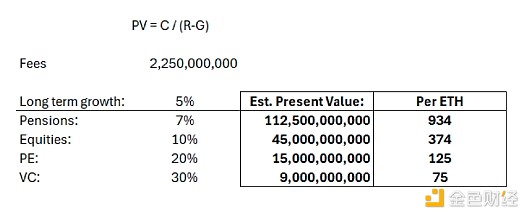
Author: Donovan Choy, Blockworks; Compiler: Tao Zhu, Golden Finance
In 2017, investor John Pfeffer published "(Institutional) Investors' Views on Crypto-Assets", which is an article A seminal paper on long-term investing in crypto tokens.
In retrospect, Pfeffer's original paper was far ahead of its time. It laid the foundation for investors to think about the magic of internet money and made many prescient predictions that still stand today.
Pfeffer believes that the long-term equilibrium outcome will be a dominant crypto-asset as a monetary store of value, and Bitcoin may be one of them. He predicts that BTC’s market cap will be between $4.7 and $14.6 trillion ($260,000 to $800,000 per BTC).
There are many reasons why Pfeffer believes Bitcoin will solidify its position as the dominant SOV, but the crux of the paper is that BTC carries minimal technical risk. To beat BTC in the SOV game, ETH will require massive intellectual coordination on a multi-year roadmap, and many technical upgrades are subject to delays and/or risks of failure.
As Hasu said in the old Uncommon Core podcast, "Nothing happening to Bitcoin is actually the best thing that could happen to Bitcoin."
Talking about Ethereum, ETH bulls today tend to argue that ETH is superior to BTC on multiple fronts: Its use as a means of payment in the EVM ecosystem solidifies its value as an SOV (besides the deflationary effects following EIP-1559).
But it’s unclear why this alone makes ETH a valuable SOV.
Cryptocurrency participants will simply need to convert their preferred "store of value into the exact amount required and in as short a time as possible" via payment channels at the time of payment, Pfeffer believes. He likened this to a retailer converting bank deposits into physical cash for payment only when needed.
Pfeffer also presciently noted that Ethereum’s scaling solutions, such as L2 and moving to proof-of-stake, will be “good for adoption/users, but bad for token value/investors.” This sentiment has proven to be extremely true, given crypto Twitter’s constant complaints about the lack of appreciation in ETH price over the last year.
So how much is ETH worth?Today, Pfeffer's landmark paper is being revisited through a newly published paper on the Triton Liquidity Fund, which he co-authored.
The paper concludes: Ethereum is a technological marvel, but ETH’s risk-adjusted upside is difficult to predict.
One can try to value ETH ascash flow assets. But Ethereum’s continued innovation in its protocol and token economics makes DCF analysis “difficult to conduct accurately.”
Even so, the paper attempts this based on the generous assumption that the issuance is net neutral, plus an average growth rate of 5%. However, no matter which discount rate is used, "ETH appears to be grossly overvalued today as a $400 billion cash-flowing asset."
One can then turn to ETH's The “currency premium” argument. But contrary to ETH bulls, ETH is not a currency – it’s not even the de facto unit of account in the EVM ecosystem (USD is). Case in point: Ethereum’s largest L2 Base last month began offering the use of USDC instead of ETH to pay gas fees.
Even if ETH is considered the primary medium of exchange on the chain, trying to justify ETH’s ~$400 billion valuation based on “currency premium” is just wishful thinking. The paper estimates Ethereum’s on-chain “GDP” at about $2.8 billion (based on annualized data over the past six months), which is about 1,000 times higher than current valuations.
The strongest argument for ETH as an investable asset is that it is the dominant internet-native commodity and productive on-chain asset. Holding ETH is not like holding gold bars or oil – one can stake it in DeFi to earn returns.
However, the paper questions whether Lido’s 3% yield outweighs ETH’s inherent volatility to the point of using it as an “internet bond.”
Conclusion: “The current market value of ETH is US$400 billion. Considering its current trend, no matter which perspective you use to evaluate it, it is difficult to prove that ETH is a risk-adjusted long-term reasonable investment... BTC Still retaining its status as a risk-adjusted sound bet, it can evolve into a non-sovereign store of value role."












